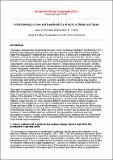Por favor, use este identificador para citar o enlazar a este item:
http://hdl.handle.net/10261/1469COMPARTIR / EXPORTAR:
 SHARE
BASE SHARE
BASE
|
|
| Visualizar otros formatos: MARC | Dublin Core | RDF | ORE | MODS | METS | DIDL | DATACITE | |

| Título: | Initial training policies and transferability of skills in Britain and Spain |
Autor: | Cruz Castro, Laura CSIC ORCID ; Conlon, Gavan P. P. | Palabras clave: | Aptitud Formación profesional Gran Bretaña España |
Fecha de publicación: | 2001 | Editor: | Consejo Superior de Investigaciones Científicas (España) | Citación: | Initial training policies and transferability of skills in Britain and Spain, Serie Documentos de Trabajo, Instituto de Políticas y Bienes Públicos (CSIC), 03-2001 | Serie: | Documento de Trabajo IPP, 03-2001 | Resumen: | This paper analyses the relationship between initial vocational education and training (VET) and life-long learning by looking at the way and extent to which different training policies foster the acquisition of general and transferable skills. General and transferable skills are defined in contrast to specific skills, as not being tied to any particular firm, sector or work process but as being applicable to a wide range of educational and professional situations. The term covers many different skills such as entrepreneurial (creativity, risk-management, responsibility, decision-making skills and initiative), interpersonal skills (flexibility, conflict-handling, team-building capacities), communication skills (reading comprehension, writing, foreign languages, negotiation skills) and other intellectual skills (mathematics, problem-solving, quality awareness and the up-dating of knowledge). General skills or qualifications are broader conceptually and they are usually defined in contrast to firm-specific ones. Both general and core skills have become increasingly valuable in labour markets that are characterised by change and where there is a constant need to adapt to new developments in technology and working methods. Concrete, specific or technical skills may become obsolete very rapidly and in addition the value of overly narrow vocational qualifications is diminishing in the light of technological innovation. The paper is organised as follows. Firstly, we consider some of the factors that particularly affect the investment in training and the investment in transferable skills. Secondly, we place the training reforms in Spain and in Britain in a contextual framework and give an outline of the direction of these reforms in relation to those intervening factors. We argue that with the reform of their national training systems, which in both cases started in the late eighties, Spain and the UK have followed different routes in order to foster precisely an increase in the investment on the type of transferable or core skills mentioned above. Those pathways differ in two main dimensions: on the one hand, the extent to which policy strategies have aimed at reducing either individual or firms' constraints to receive or invest in transferable training; on the other hand, the extent to which the emphasis for certification focused on "demonstrated learning outcomes" (as opposed to "particular learning processes or places"). Finally, we present some of the policy lessons from the experience of both sets of reforms identifying the characteristics that might contribute and those that might hinder such investment. | Versión del editor: | http://ipp.csic.es/es/workpaper/initial-training-policies-transferability-skills-britain-spain | URI: | http://hdl.handle.net/10261/1469 |
| Aparece en las colecciones: | (CCHS-IPP) Informes y documentos de trabajo |
Ficheros en este ítem:
| Fichero | Descripción | Tamaño | Formato | |
|---|---|---|---|---|
| initial_transferability_skills.pdf | 226,08 kB | Adobe PDF |  Visualizar/Abrir |
CORE Recommender
Page view(s)
348
checked on 19-abr-2024
Download(s)
155
checked on 19-abr-2024
Google ScholarTM
Check
NOTA: Los ítems de Digital.CSIC están protegidos por copyright, con todos los derechos reservados, a menos que se indique lo contrario.
